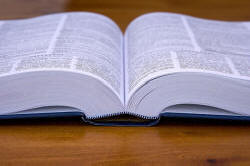Delta Module One, Paper 1, Task 2 : lexis 1

Think of a good definition of the term and then click on the
![]() to reveal some suggestions.
to reveal some suggestions.
Obviously, you won't have the same wording or examples but as long as
you are happy with what you have, that's OK.
| syntagmatic
relationship |
The horizontal relationship in syntax between words.
For example, the verb 'go' and the prepositional phrase have a syntagmatic relationship in 'He went to the station' and can only be replaced by a verb and adverbial respectively |
| paradigmatic
relationship |
A relationship based on word- or phrase-class which
allows the replacement of items with ones belonging to
the same class.
For example, in 'The house fell down', the word 'house' can be replaced with many nouns or noun phrases while maintaining the relationship with the verb: The shed fell down, The tree fell down, The old man with the stick fell down etc. |
| derivational
affixation |
Affixes, usually suffixes, which can be used to change the
word class and derive one lexeme from another.
For example, 'national' can be derived from 'nation' and 'nationalise' from 'national' and so on. |
| conversion |
A lexeme can be converted without affixation from
one word class to another.
For example, the noun 'Google' has now been converted into the verb 'to google' something. |
| hyponymy |
Describes the relationship between hypernyms or
superordinate terms and the items they subsume.
For example, 'vegetable' is a hypernym of the co-hyponyms 'carrot', 'potato', 'pea', 'cabbage' etc. |
| converse
antonym |
Antonyms which imply their converse words such as
'nurse' and 'patient', 'mother' and 'daughter' etc.
|
| binomial |
Two lexemes, often connected with 'and' which form a
fixed-order idiom.
For example, 'to and fro', 'over and out', 'smoke and mirrors' etc. |
| bound morpheme |
A unit of meaning which cannot stand in isolation.
For example, the morpheme 'ness' making a noun from
'lovely' ('loveliness') cannot have the same meaning
standing alone (when it means a headland).
|
| polysemy |
The ability of a word to have more than one related
meaning.
For example, 'table' can mean a piece of furniture or a tabulated set of figures. The meanings are related but not identical. |
| Paper 1 revision test index | next exercise |
